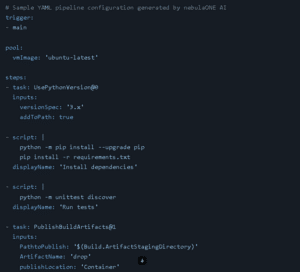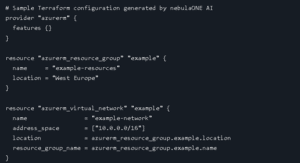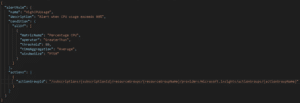
Looking Back at 2025: A Year of Metamorphosis
When I sat down to think about all the things I could write about to sum up the year, it immediately felt overwhelming. So much has changed about our organization; the customers we serve, the product...

In the fast-paced world of DevOps, efficiency, automation, and data-driven decision-making are crucial for success. Azure DevOps provides a powerful, comprehensive suite of tools for managing the software development lifecycle, but managing its complexities can be time-consuming and error-prone. This is where nebulaONE® AI comes in—an intelligent assistant that enhances DevOps workflows by automating routine tasks, detecting errors, and optimizing performance.
In this blog post, we will explore five common Azure DevOps tasks where nebulaONE AI can significantly improve efficiency, automate processes, and enhance decision-making for Dev-Ops engineers. Through practical examples and code snippets, we’ll demonstrate how nebulaONE AI can streamline DevOps operations and help teams achieve faster, more reliable software delivery.
Five Common Azure DevOps Tasks Enhanced by nebulaONE AI
Leveraging nebulaONE AI can significantly enhance efficiency, automate processes, and improve decision-making for DevOps engineers. Below are five common tasks where nebulaONE AI can be particularly beneficial:
Use Case: Automating the creation and management of CI/CD pipelines to ensure smooth and efficient code deployment.
Modern software development relies on CI/CD pipelines to automate the process of building, testing, and deploying applications. However, configuring these pipelines manually can be complex and error-prone, leading to delays and inefficiencies. NebulaONE AI helps DevOps engineers create optimized pipelines that minimize manual intervention and improve deployment reliability.
How nebulaONE AI Helps:
You can leverage nebulaONE AI by providing your existing CI/CD configuration and asking it to analyze potential issues, suggest improvements, or even generate an optimized YAML pipeline from scratch.
Example:

Key Takeaway: NebulaONE AI streamlines CI/CD pipeline setup and maintenance, reducing manual effort and minimizing errors.
Use Case: Automating the provisioning and management of cloud infrastructure using Infrastructure as Code (IaC) tools like Terraform or ARM templates.
Manually managing cloud infrastructure can be error-prone and inefficient, leading to inconsistent deployments and security risks. Infrastructure as Code (IaC) enables DevOps teams to define and manage infrastructure in a repeatable and scalable way but writing and maintaining templates manually can be complex. NebulaONE AI simplifies this by automatically generating, validating, and optimizing IaC templates based on best practices.
How nebulaONE AI Helps:
Users can interact with nebulaONE AI by asking, “I have this Terraform code that is performing slowly. Can you help me identify issues and optimize it?” or “I frequently use this Terraform code; help me create reusable modules to eliminate redundancy.”
Example:

Key Takeaway: NebulaONE AI automates the generation and validation of IaC templates, ensuring efficient and compliant infrastructure management.
Use Case: Enhancing proactive monitoring and automating incident resolution to maintain system reliability.
Monitoring application and infrastructure health is essential for identifying and resolving issues before they impact users. However, setting up effective monitoring and responding to incidents manually can be overwhelming. NebulaONE AI helps streamline this process by detecting anomalies, optimizing alerting, and suggesting remediation steps.
How nebulaONE AI Helps:
You can utilize nebulaONE AI by providing your current monitoring configurations and asking, “How can I improve my alerting system to reduce noise while ensuring critical incidents are flagged?”
Example:

Key Takeaway: NebulaONE AI enhances monitoring and incident management by automating anomaly detection, incident response, and alerting.
Use Case: Ensuring continuous security and compliance monitoring throughout the DevOps lifecycle.
Security vulnerabilities and compliance violations can lead to costly breaches and regulatory penalties. Manually scanning for security risks is inefficient and prone to human error. NebulaONE AI integrates security checks into the DevOps workflow, ensuring vulnerabilities are detected and mitigated early.
How nebulaONE AI Helps:
For a hands-on experience, new users can provide their security scan configurations and ask nebulaONE AI, “Can you check for vulnerabilities in this code and suggest compliance improvements?”
Example:

Key Takeaway: NebulaONE AI automates security and compliance checks, ensuring applications and infrastructure remain secure and compliant.
Use Case: Ensuring applications and infrastructure run efficiently by identifying and resolving performance bottlenecks.
Performance issues can lead to slow application response times, increased infrastructure costs, and poor user experience. Identifying bottlenecks manually can be time-consuming and requires deep expertise in profiling code, database queries, and resource utilization. By leveraging nebulaONE AI, teams can proactively detect inefficiencies, recommend improvements, and even apply optimizations automatically.
How nebulaONE AI Helps:
Users can experiment by providing a performance report and asking, “nebulaONE, can you analyze and recommend optimizations for my application’s database performance?”
Example:

Key Takeaway: NebulaONE AI continuously monitors and optimizes application performance, ensuring that DevOps teams maintain high-performing, cost-effective, and scalable software solutions.
Conclusion
By leveraging nebulaONE AI for these common Azure DevOps tasks, DevOps engineers can significantly improve efficiency, automate repetitive processes, and enhance decision-making. The practical examples and code snippets provided illustrate how nebulaONE AI can be integrated into day-to-day operations, ultimately leading to more streamlined and effective DevOps practices.
🔎Explore More AI Innovation
Want to see how other top companies are transforming with AI? Download the AI Innovation Guide, co-created by Cloudforce and Microsoft, featuring stories from UCLA, UMD, and more — and discover how secure, branded AI is reshaping the future across industries.

When I sat down to think about all the things I could write about to sum up the year, it immediately felt overwhelming. So much has changed about our organization; the customers we serve, the product...

As a consultancy positioning ourselves as the human touch behind tech, it should come as no surprise that our criteria for success aren’t solely demonstrated by profit margins. Just as...

Cloudforce has expanded nebulaONE® operations globally, now serving institutions and companies across the Americas, United Kingdom, Europe, Australia, New Zealand, and beyond. What began as...